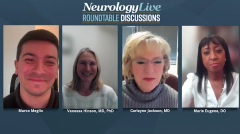
Episode 5: Emerging Women-Related Research and Closing Thoughts

The group of women neurologists provided commentary on the critical areas of women-focused research in neurology, from clinical trial participation to addressing workforce challenges.
Episodes in this series
Women have made significant strides in neurology, bringing unique perspectives and innovations to the field. Historically underrepresented, women neurologists have worked to break barriers, advocate for inclusivity, and address issues like work-life balance and equitable opportunities. Their leadership has driven changes such as flexible scheduling, support for family responsibilities, and expanded resources for women’s health-related neurological issues. As more women enter neurology, their impact continues to grow, enriching the profession with diverse voices and approaches to patient care.
In collaboration with the
In the final episode, the panel shared insights on advancing women-specific research in neurology, emphasizing the need for greater diversity in clinical trials and the importance of addressing women’s health issues across specialties. They highlighted the benefits of clinical trial participation, both for professional growth and patient care, and advocate for more women leaders in research and academia. The conversation also touches on why women are leaving the neurology workforce, with the "Leaky Pipe Survey" aiming to identify and address these challenges. Lastly, the panelists underscore the value of self-care, empathy in patient care, and mentorship to empower future generations of women in neurology.
Marco Meglio: Talk a little bit about some of the women-related or women-specific research themes that you feel are of the greatest importance right now and will be moving forward. Just give us a perspective from the research side.
Carlayne Jackson, MD: I'll just say that I predominantly do ALS research, and in every study that’s been conducted, there are far more men than women enrolled in trials. I think that reflects, at times, the investigators themselves—patients tend to align with physicians of the same gender. So, having more women engaged in research will likely encourage more women to enroll in trials. That’s probably the only context in which I’ve personally played a role in promoting women in research, but it’s certainly a major concern. Many trials lack diversity; they don’t have enough Hispanic, Black, or female participants—most of the study populations are white men. We need to do a better job addressing this.
Vanessa Hinson, MD, PhD: I also want to encourage women to think beyond traditional research paradigms, like submitting an R01 to the NIH, which has a very slim funding chance. Consider clinical trials—they’re incredibly rewarding. I do them in movement disorders, and Dr. Jackson does ALS. Patients come to academic medical centers seeking enrollment in trials that might offer better options than existing therapies. Clinical trials in neurology have exploded over the last few decades, and being part of them—whether as a site investigator or otherwise—is gratifying. It also diversifies your portfolio and skill set as a physician, which makes you very valuable to your department. Plus, clinical trials can provide financial support beyond just RVUs. Learning about trial protocols, the business side of trials, and development is invaluable—and you’re offering a great service to patients.
Marie Eugene, DO: As an epileptologist, a big subset of my patients are women. I counsel them on issues like choosing anti-seizure medications or contraceptive use, and I’m able to do that because we already have some strong data in these areas. But there’s still much more to be done. Continued efforts to address women-specific issues in epilepsy—and across all subspecialties in neurology—are critical. Hopefully, these topics will continue to get the attention they deserve.
Carlayne Jackson, MD: Another important research angle is understanding why women are leaving the neurology workforce. As you mentioned earlier, we already face a workforce shortage. The Academy has started a survey called the "Leaky Pipe Survey" to investigate this. Why are women leaving, and what can we do to retain them? This kind of research is just as crucial as clinical studies.
Marco Meglio: You all bring up great points. Dr. Eugene, I know from the epilepsy side we’re seeing more innovative studies focused on women of childbearing age, lactating women, and similar populations. It’s great to see this shift happening. To wrap up, I’ll give each of you an opportunity for any final thoughts or comments about today’s panel or the topics we’ve discussed.
Carlayne Jackson, MD: My main takeaway is to remind everyone to take care of themselves. If you’re not well physically, emotionally, or spiritually, you won’t be an effective leader, parent, or provider. Prioritize your own wellness—it’s critical.
Vanessa Hinson, MD, PhD: Don’t underestimate the impact you have on your patients. Women bring compassion and an understanding of the holistic experience of being ill—not just for the patient but also for their caregivers. Women often take on the caregiving role within families, and we see and recognize this dynamic in our patients. Patients truly appreciate that empathy.
Marie Eugene, DO: I’d add that having women role models in academia is vital for medical students and residents. It provides a source of guidance, mentorship, and comfort for younger professionals. Since 2019, more than half of U.S. medical school enrollees have been women. We have the collective woman power to lead in various fields, whether in academia, private practice, or beyond.
Newsletter
Keep your finger on the pulse of neurology—subscribe to NeurologyLive for expert interviews, new data, and breakthrough treatment updates.











